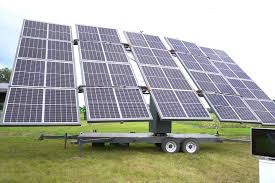A solar generator is an extremely useful and adaptable power source. You may use one to get electricity on the go or as a backup energy source for your house. You may be wondering, before purchasing one, what size solar generator I require. To answer that, you must first determine what size best fits your needs.
With so many capacities available on the market, determining which one is best for you might be difficult. So, how do you determine what size solar generator to get? This solar generator buyers guide will show you how to size a solar generator depending on your electricity requirements. However, before we get started, we might need to know:
What Is The Definition Of A Solar Generator?
Solar generators supply backup power using a Yeti Power Station and a solar panel. It’s as easy as that. Two goods that, when combined, form a solar generator. Our portable solar generators provide clean energy to recharge our electronics or power our houses, RVs, automobiles, boats, and, on occasion, crock pots at the apres-ski tailgate.
One of our most flexible power options is the Yeti 1000X + Boulder 100 Briefcase Solar Generator. It may be used for everything from tailgating to backing up refrigerators and televisions.
The Yeti 1000X may be recharged in 12 hours using solar energy generated with the portable Boulder 100 Briefcase or in as little as 2 hours with additional solar panels. Our Yeti 3000X + Boulder 200 Briefcase is another sustainable energy source and an excellent choice for home backup.
When used in tandem, this solar generator can power your yurt, lodge, workshop, or suburban house during a power outage. You can also use it to fuel your wood-fired barbeque if you’re in a rush at home.
The highest-capacity solar generator is designed for the most power-hungry electronics and appliances. The Yeti 6000X + 2 Boulder 200 Briefcase can power your house for days and charge in as little as eighteen hrs from the sun. More solar panels can be combined for quicker charging.
What Are The Most Common Applications For Solar Generators?
We take electricity for granted since it is integral to our daily lives. Unfortunately, when missing, we are reminded of how much contemporary civilization depends on energy.
Solar power generators may be incredibly beneficial in various situations since they provide a practical method to generate, transfer, and consume electricity.
Types of Generator Fuel (Natural Gas, Propane, Diesel)
Most standby house generators run on natural gas, propane, or diesel.
Diesel generators are far more fuel efficient and run much longer than natural gas or propane generators, but the initial cost might be 2-3 times more.
12kW and 14kW generators can run on either natural gas or propane. Customers that live off-grid often use propane rather than natural gas. However, these models may be customized to function with any fuel type.
Generator Dimensions
The generator should generally be around double the inverter’s continuous output size. A 4,000-watt inverter, for example, should be connected with an 8,000-watt generator. The generator must charge batteries while also powering the loads (appliances that use power).
If the total load is 4,000 watts and the charger is 60 amps at 48 volts, the total continuous power is roughly 7kW:
60 amps x 48 volts equals 2,880 watts Plus 4,000 watts equals 6,880 watts
8kW would be a reasonable minimum generator size to power the loads while charging the battery bank.
It’s always best to round up slightly to give the generator some headroom, especially at higher elevations when your generator loses some power. Engines can lose up to 3% of their energy for every 1,000 feet of altitude gain. If your system is at a high elevation, make sure to account for this.
Is It Possible To Use A Larger Generator?
A bigger generator might be useful if you have high loads that will only be utilized when the generator is operating, such as an air conditioner or a welder.
With our off-grid systems that use a 4000w inverter, we commonly offer 12kW and 14kW Kohler generators. A bigger generator will consume more fuel but will still function properly.
Can I Use A Small Generator (Less Than 500 Watts)?
Although not everyone needs more than 1000W of electricity, the purpose of this article is to assist consumers in making important purchasing decisions. Smaller generators will still operate, but the parameters must be adjusted to restrict the battery charger’s output. The AC input amperage and charge rate of most battery chargers may be changed.
The best is if you match the generator’s voltage to the inverter’s. For example, 120Vac generators should be connected with 120Vac inverter/chargers, but 120/240Vac generators require a 120/240Vac inverter.
The same restrictions apply whether you use a three-phase generator or inverter: the generator’s voltage must equal the inverter’s voltage.
Top 3 Small Solar Generators:
- EcoFlow River 600
- Jackery Explorer 500
- Rock Pals 520
Those with lower electrical needs might also consider a Lion Energy solar generator. Both the Lion’s Safari LT and the Cub Go are useful for carrying and utilizing solar energy while on the go. These devices, which weigh about 11 and 3 pounds, are ideal for continually powering gadgets such as laptops, phones, cameras, and other tiny electronic equipment.
What Type Of Solar Generator Kit Should You Get?
Most individuals will find that one of the EcoFlow Delta, Bluetti AC200P, Bluetti EB240, or base camp solar generators are the best option. These all offer a good balance of battery and power and are within most people’s price ranges. If you need as much electricity as possible, you might pick one of the modular solar generators in the Titan or Lion Safari ME.
If you’re searching for a solar generator for around $1,000, there’s not much difference between the manufacturers and features. The EcoFlow River 600 or the Jackery Explorer 500 are the best options here, but more on smaller solar generators follow.
Conclusion
Solar generators offer clean, renewable energy as a low-maintenance power source wherever needed. Whether at home or outdoors, or both. They can be an excellent investment. However, getting the appropriate size for your energy requirements is important.
That is why Jackery provides solar generators with various power stations to guarantee you discover one that meets your needs and budget. Always consider what gadgets you want to power and for how long.
Suppose you are unclear about how much electricity you require. In that case, we hope this article will assist you in calculating the appropriate size power station and, as a result, the proper size solar generator for you.





Be First to Comment